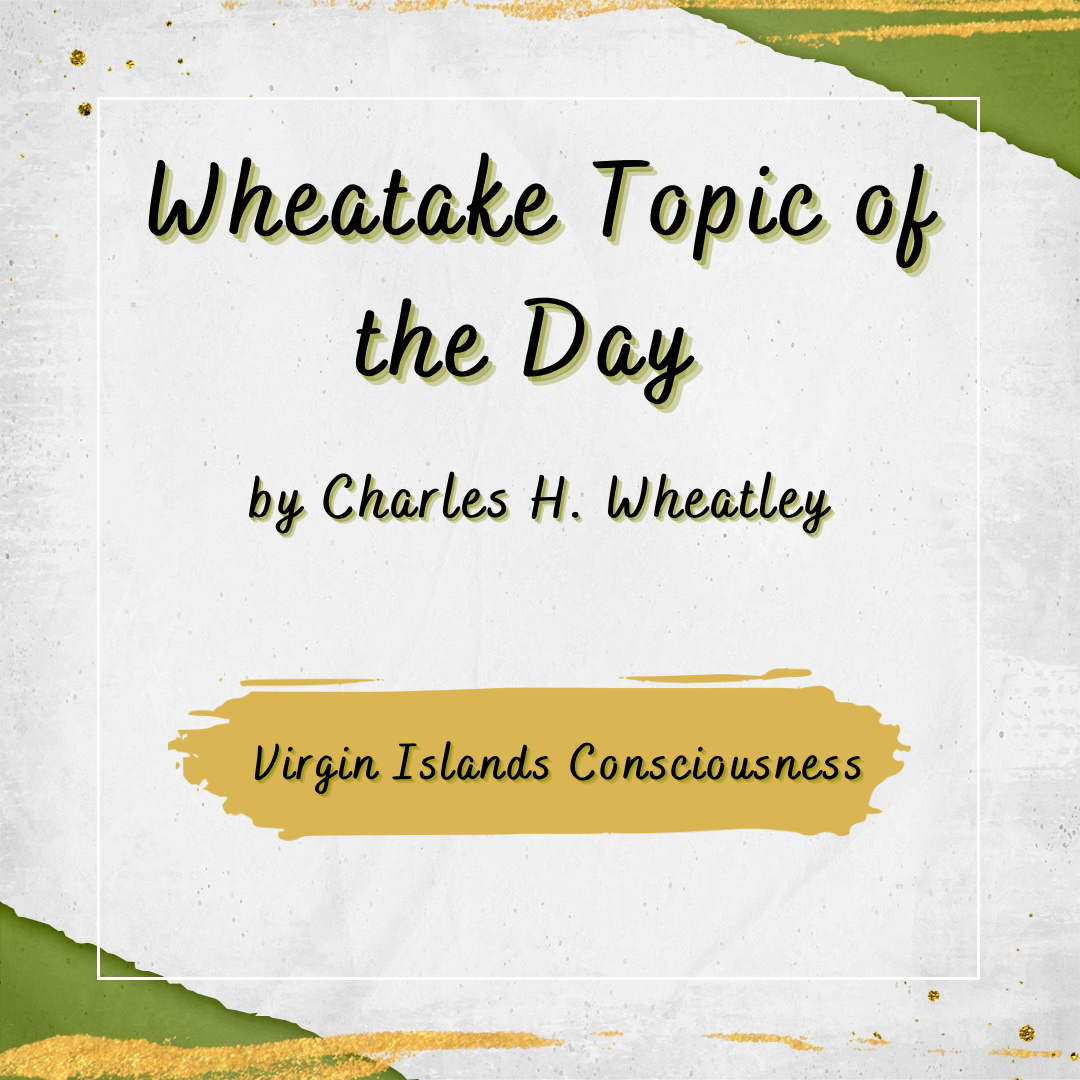There are many efforts today attempting to define who is a Virgin Islander. The
identity of any group or persons constitutes characteristics such as behaviour patterns, experiences, traditions and the list goes on. This Wheatake shares some of my understanding of the consciousness of Virgin Islanders which is part of a defining marker of a Virgin Islander. I am referring to what I call “Virgin Islands Consciousness. "Many factors contribute to this consciousness, but I am going to mention four:
a. Changes in how we use language
b. religious preferences
c. Geographical factors
d. Political factors’
a. Changes in how we use language
Changes in the use of language and the way we accept and internalize new ideas, concepts, and principles, and discard the traditional ones are rooted in our consciousness. When I refer to the consciousness of Virgin Islanders, I am referring to the sense of right and wrong that governs our collective thoughts and actions as Virgin Islanders. An example that illustrates my thinking is the style of our August Monday Festival (not carnival) Celebrations. It grew out of the civic pride of the leaders of the 1950’s who emulated the organized territorial celebrations of the Coronation of Queen Elizabeth II. They took the features of the troops in costumes, the parade of that celebration, and merged them with the traditional August Monday picnics, boat races and church fetes and designed a form of celebration to highlight the trials, triumphs, tears and smiles, successes and failures, tragedies and comedies, of our forebears since emancipation. It was meant to heighten the consciousness of Virgin Islanders about their unique heritage. The changes in the composition of the population and the infiltration of “foreign ideas and language expressions” change the “Rise and Shine Tramp,” designed with a purpose to jouvert which is a feature of carnival in other places where the purpose and emphasis are different. Hence the consciousness of the Virgin Islands towards its festival has changed into what it has become today.
b. Religious preferences
The consciousness of the Territory has been changing quietly and subtly through religious preferences and on religious bases. For instance, some persons in authority have been using their religious persuasion to influence the secular operations of the state through appointments, promotions, transfers, and scholarship. These elements have been creeping into the public business of the state as well as private business. Once the influences are entrenched, they redesign, redirect, condition and control thought processes. Given time the separation of church and state could be blurred if not blotted out.
Geographical Factors
The third factor which has contributed to the consciousness of the Virgin Islands is Geography and its effects on Virgin Islanders' behaviour. The sea as a highway connecting islands and villages has brought us closer to one another and increased our understanding of differences and similarities of Virgin Islanders from various regions, villages or locations. Anegada has moved (not physically) from the fringes of Virgin Islands consciousness in 1949 after Theodore Faulkner’s public opposition to the attitude and behaviour of the ruling powers of the day towards Anegadians, thus initiating a turning point in the Territory's consciousness towards Anegada.
The role of the sea in Virgin Islands heritage, from a communication highway connecting the islands to a supplier of abundant foods and a source of recreation has featured highly in the consciousness of Virgin islanders. The consciousness has been reflected in understanding the currents, tides, the lunar and solar effects on the planet earth, the effects of the stars on marine and terrestrial pursuits, the season of ground swells (large waves rolling in from the Atlantic meadows) the strong chilly north winds versus the soft south winds with their warmth, the wonder of salt crystallizing, and the power of the sea in purifying itself.
The emigration of Virgin Islanders to other Caribbean countries including the Netherland West Indies, the Dominican Republic, Cuba and the United States of America contributed to the awakening of the consciousness of Virgin islanders to possibilities in education, business, social life and family life, as members of a family may live under different nationalities, cultural influences, work ethics, and other social influences. The influence of the Danish West Indies which became
the Virgin Islands of the United States in 1917 extended the consciousness of Virgin Islanders in new directions towards new and challenging possibilities.
Political Factors
Political factors have been shaping the consciousness of Virgin Islanders for decades. At the time of writing, they feature strongly in every conversation as the Territory awaits the results of a pending election and the outcome of a Constitutional Review which is currently in progress. When the Territory became part of the Leeward Islands Federation in 1871, the Federation initiated a controlling dimension on its consciousness. As an outlier in that organization, this Territory was never considered to be good for anything. Some people believed it was only good as a bird sanctuary. They believed that Virgin Islanders were incapable of leading themselves as the legislative council was suspended in 1902 and the power and authority to govern the Territory was transferred to the Governor who resided in Antigua. Through the ingenuity of shining Virgin Islands stars that strangle-hold was partially removed, but efforts to influence, curb, debase and erase (if that were possible) the Virgin Islands consciousness never ceased. Every constitutional change was designed to force the consciousness of Virgin Islanders into a mold designed by others. They used the consciousness of Virgin Islanders to sweeten their coffee for decades and then turn them adrift in 1834. Within that framework, Virgin islanders' consciousness has brought them to this day, “through difficulties to the stars.”
Today the System and its institutions are being challenged and within this challenge there are signs that some of them have begun to crumble before our eyes. The Virgin Islands’ consciousness to strive for excellence which we once knew, and was instilled in us at home, school, church, and the workplace, seems to be on a march to lower grounds. Chinua Achebe expresses this trend in the book “Things Fall Apart” like this:
“The present situation and challenges confronting us as people are consequences of poor leadership, nepotism, and fantastically corrupt mindedness. Therefore, it has become absolutely necessary for a reorientation of our mindset. The time for a long awaited ‘revolution of values’ is now; we cannot continue like this.”
Although the writer’s consciousness is set in a different context, there are elements in the observations which are applicable to us in our present struggle.
In concluding, the consciousness of Virgin Islanders should be rooted in the Christian ethics, which advocates right is might, and Christ is our strength and right.

